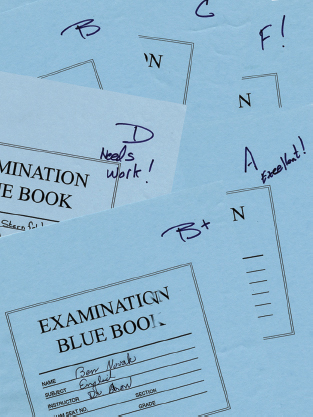Understanding essay exams
got a test tomorrow?
UNDERSTANDING ESSAY EXAMS. You’ve probably taken enough essay exams to know that there are no magic bullets to slay this dragon and that the best approach is to know the material well enough to make credible points within the time limit. You must also write — under pressure — coherent sentences and paragraphs. (improve your sentences) Here are some strategies to increase your odds of success.
Anticipate the types of questions to be asked. What occurs in class — the concepts presented, issues raised, assignments given — is like a coming-
Read exam questions carefully. Underscore key words such as divide, classify, evaluate, compare, compare and contrast, and analyze and then respect the differences between these strategies. (develop a draft) Exam questions may be like short essays themselves, furnishing contextual information or offering materials to read before the actual query appears. Respond to that specific question and not to your own take on the introductory materials.
Sketch out a plan for your essay(s). The first part of the plan should deal with time. Read all the exam questions carefully and then estimate how many minutes to spend on each —understanding that some will need more work than others. (Pay attention to point totals too: Focus on essay questions that count more, but don’t ignore any. Five points is five points.) Allow time for planning, writing, and briefly editing each answer. Then stick to your time limits.

Organize your answers strategically. As quickly as possible, create a scratch outline and thesis for longer answers. (develop a statement) In the first paragraph, state this main point and then preview the structure of the whole essay. That way, even if you cannot finish, a reader will know where you were heading and possibly give you partial credit for incomplete work.
Offer strong evidence for your claims. The overall pattern of your responses to exam questions should convey your grasp of ideas — your ability to see the big picture. Within that structure, provide details and evidence to prove your command of the subject. Use memorable examples culled from class reading to make key points: Mention important names, concepts, and dates; touch on all critical issues and terms; rattle off the accurate titles of books and articles.
Come to a conclusion. Even if you run short on time, find a moment to write a paragraph (or even a sentence) that brings your ideas together. Don’t just repeat the topic sentences of your paragraphs. A reader will already have those ideas firmly in mind. So add something new at the end — an implication or extrapolation. (shape an ending)
Keep the tone serious. Write essay examinations in a high or middle style. (refine your tone) Avoid a personal point of view unless the question invites your opinions. Given the time constraints, you can probably get away with contractions and standard abbreviations. But make sure the essay reads like prose, not a text message.
Keep your eye on the clock. But don’t panic. Everyone is working under the same constraints and will produce only so much prose in an hour or two. If you have prepared for the exam and start with a plan, ideas will come. Even if they don’t, keep writing. You’ll get no credit for blank pages.